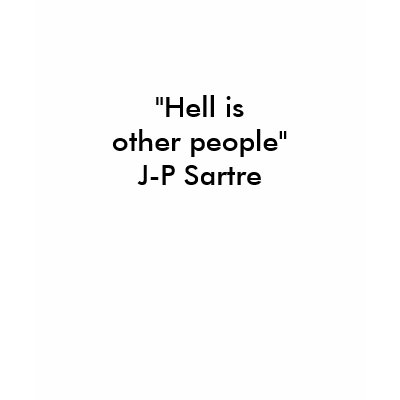Themes of this play...
I have covered some of it, but let's recap the major themes of No Exit. Please have on mind
that this is completely my opinion, it is my perspective and you may not find
those themes in this play or you may find other themes - and it is absolutely
fine. Actually I believe that this is the beauty of art...
The purpose of life: we see that those 3 characters had bad
lives, full of sins, conflicts etc. After their death they are left in a room
with other people like themselves forever. This makes me think about something.
What should have they done differently not to end up in hell? Maybe you will
say: do not commit sins in order to go to heaven instead of hell. Yeah, that
makes sense... but... actually I love doing wrong things, they are things that
shape my future. Every time I make something bad I say "I cannot regret I
did it because it was a great experience and I learnt a lot from doing so, but
I will not do it again". I believe that people who learn from doing things
like that would not say that doing only "good" is the way. Those
people learn from their mistakes from the past so that their decisions in the
presence are better-based on practical knowledge. So... what is the solution
for having a "good" life and not to end up in hell (btw. what is the
definition of good and bad, isn't it subjective?)? ... now think...
Lives full of poo: we can see that those 3 characters
had miserable lives full of stupid values. They die and go to hell and
care about not having mirrors or windows there. Let me write here my note I
made during the reading (sorry for the language) "You are dead and you
care about mirrors and your look bitch?!". Those people are dead and are
in hell... well, wouldn't that be the evidence of the existence of the god or something?
Or, wouldn't that be the best time to realize that I was lame? It seems that
mirrors are more important than the purpose of life... Moreover, isn't this
play a message for us, to change something before we end up in that situation?
...now think...
The Theme: Now Think!
I believe that this is the most important theme in this play. As I
said in previous entries everybody can see different things/meanings in art -
depends on your perspective (I wïll not repeat those things, read previous
entries) so I would say that the most important theme here is to force us to
think about those things. If this was not lit.class I would just write:
"Themes of this play: thinking". And I am sorry that I did not write
any answers, but I do not know them ... yet. How about you? Think a little bit,
believe me, it will not kill you...
cheers
chris




